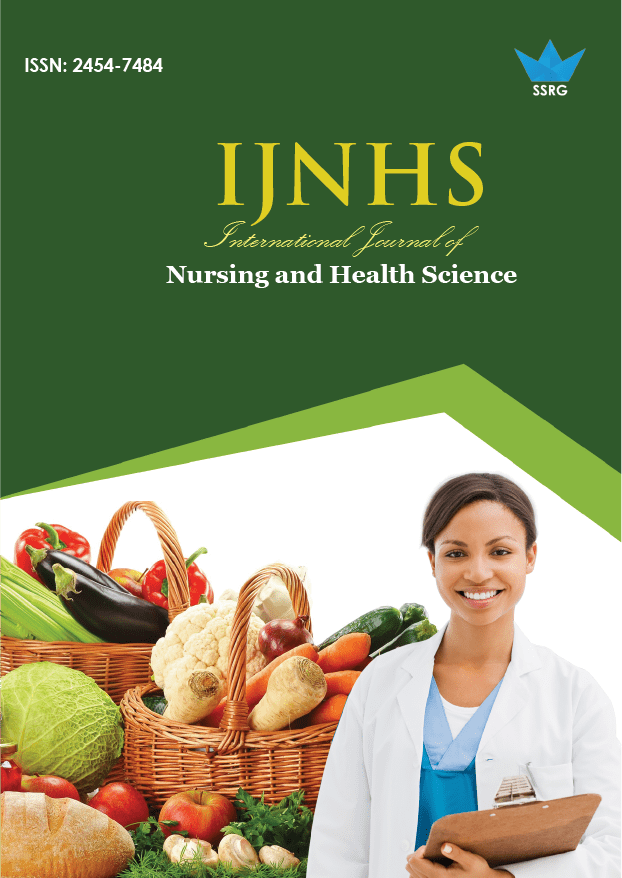A Study to Assess the Effectiveness of Structured Teaching Programme on Knowledge and Attitude of Adolescent Girls Regarding Menstrual Hygiene Management

| International Journal of Nursing and Health Science |
| © 2017 by SSRG - IJNHS Journal |
| Volume 3 Issue 2 |
| Year of Publication : 2017 |
| Authors : Anugrah Charan |
How to Cite?
Anugrah Charan, "A Study to Assess the Effectiveness of Structured Teaching Programme on Knowledge and Attitude of Adolescent Girls Regarding Menstrual Hygiene Management," SSRG International Journal of Nursing and Health Science, vol. 3, no. 2, pp. 1-6, 2017. Crossref, https://doi.org/10.14445/24547484/IJNHS-V3I2P101
Abstract:
A study to assess the effectiveness of structured teaching program regarding the knowledge and attitude of adolescent girls regarding Menstrual Hygiene Management at selected schools of Uttar Pradesh was undertaken by Clinical Instructor Anugrah Charan, Staff Nurse Shanthi A Thomas at Nightingale Institute of Nursing, NOIDA, Chaudhary Charan Singh University, Meerut during the year 2013-2014. The objectives of the study were: 1. Develop a structured teaching program for adolescent girls regarding menstrual hygiene management. (2). Assess and evaluate the knowledge of adolescent girls regarding menstrual hygiene management. (3) Assess and evaluate the attitude of adolescent girls regarding menstrual hygiene management. (4) Seek the relationship between post-test knowledge scores and post-test attitude scores of adolescent girls regarding menstrual hygiene management. An evaluative research approach was considered to be appropriate for the present study, and the research design adopted was one group pretest and post-test research design. In this study, the independent variable was the Structured Teaching Programme regarding Menstrual Hygiene Management, and the dependant variable was Knowledge and Attitude levels of Adolescent girls regarding Menstrual Hygiene Management. The population of the present study includes 30 Adolescent Girls studying in G S Model School NOIDA. The purposive sampling technique was used for selecting Adolescent Girls. Based on the objectives of the study, the following instrument was developed in order to generate the data. (1). Structured Knowledge Questionnaire. (2). Attitude Scale. . The tools along with rating scale were submitted to the 7 experts from the field of nursing. . Pilot study was conducted from 10/03/14 to 12/03/14 on 10 adolescent girls, followed by the final study. Analysis and interpretation of data were based on the objectives of the study. Data were analyzed and interpreted using both descriptive and inferential statistics in terms of frequencies, percentages, correlation. The findings of the study had several implications on nursing practice, nursing research, nursing education, and nursing administration. Based on the findings, recommendations for further research were made. The results of the study showed that Most of the Adolescent girls-18 (60%) were in the age group of 13-14 years. Majority of samples [83.3%] were informed about periods, and [16.6%] were not informed, [83.3%] were informed about menstrual hygiene, and [16.6%] were not informed about menstrual hygiene. Majority of the samples [90%] use sanitary pads during periods, and [10%] use cloth pads. Structured Teaching Programme was effective in enhancing the knowledge and changing the attitude of adolescent girls regarding Menstrual Hygiene and Management.
Keywords:
Knowledge, attitude, adolescent girls, Menstrual hygiene, Management.
References:
[1] World Health Organization. Programming for adolescent health and development, WHO Technical Report Series 886 (1996) 2.
[2] WHO: The Reproductive Health of Adolescents: A Strategy for Action; A joint WHO/UNFPA/UNICEF Statement, Geneva, (1989)7.
[3] India has the world's largest youth population: UN report: PTI Nov 18, (2014), 02.31 PM IST.
[4] Gupta S, Sinha A., Awareness about reproduction and adolescent change school girls of different socioeconomic statuses. Journal of Obstetrics and Gynecology of India, 56(4) (2006) 324-328.
[5] Dasgupta A., Sarkar M. Menstrual hygiene: How hygienic is the adolescent girl? Indian J Community Med. 33(2) (2008) 77-80.
[6] Drakshayani Devi K, VenkataRamaiah P. A study on menstrual hygiene among rural adolescent girls.Indian J Med Sci., 48 (1994)139–43.
[7] Amann-Gainotti M. Sexual socialization during early adolescence: the menarche. Adolescence, 21(83) (1986) 703-710.

 10.14445/24547484/IJNHS-V3I2P101
10.14445/24547484/IJNHS-V3I2P101